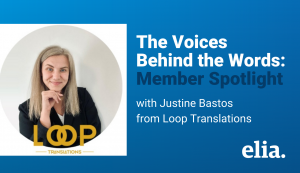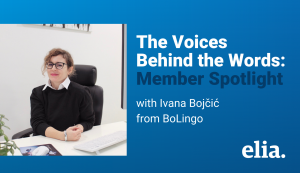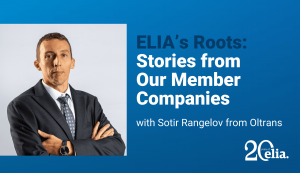Welcome to the second article in our ELIS 2025 Discussion Series, where we reflect on key findings from this year’s European Language Industry Survey. This edition focuses on ISO certification—a topic that continues to divide opinion across the industry.
Many LSCs invest in ISO standards such as ISO 9001 (quality management), ISO 17100 (translation services), and ISO 18587 (post-editing of machine translation) to demonstrate professionalism and ensure consistent delivery. But with relatively low client-side demand reported in the ELIS data, some are questioning whether the effort is still worthwhile.
Do these certifications support us internally—through training and workflow alignment—or have they become more of a checkbox exercise? Do clients value them? Are the standards keeping up with industry evolution?
To explore these questions, we’re joined again by Anu Carnegie-Brown (ACB) and Stéphane Hue (SH), who bring their insight and hands-on experience to the discussion.
Understanding ISO Certification in the Language Industry
In our industry, the term ‘certified’ can be ambiguous. On one hand, it refers to certified translations—typically required by public authorities, carried out by sworn or authorised translators. On the other, it refers to ISO-certified language service providers (LSPs)—companies that have adopted international standards and undergone impartial audits.
Three ISO standards are most commonly used in our sector:
- ISO 17100:2015 – Translation Services: The umbrella standard for translation process quality, currently under revision with updates expected to begin in late 2025.
- ISO 9001:2015 – Quality Management Systems: A global standard helping organisations improve performance, meet customer expectations, and demonstrate a commitment to quality.
- ISO 18587:2017 – Post-editing of Machine Translation Output: Designed to guide quality in hybrid workflows, with a revised version expected in 2026. The update includes debate over changing the term machine translation to non-human translation.
Language Company Certifications
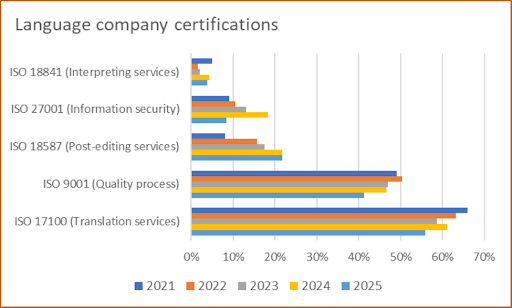
ISO 17100 and 9001 certification levels are gradually declining. Certification for post-editing (ISO 18587) is stagnating and ISO 27001 (information security) lost virtually all its momentum. The number of language companies that do not have any certification remains stable at approximately 30%.
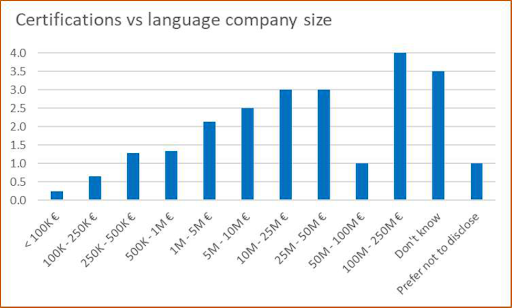
The apparent general loss in certification interest is undoubtedly at least partially due to the smaller average size of the participating language companies, in particular the segments between 1 and 10 M euro which are traditionally very active in certification.
Certification Requirements from Buyer Side
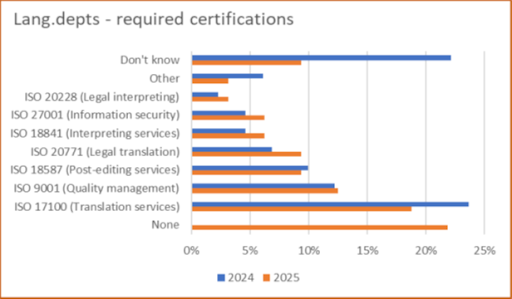
22% of respondents claim that their organisation does not require any type of certification from their language providers. The need for ISO 17100 – the most popular standard among language companies – dropped from 23% to 18%.
ACB: The ELIS report indicates that many more LSCs have acquired an ISO9001 or ISO17100 certification than what is required by client-side buyers. I’d also guess that the buyer companies that engaged with the ELIS survey are more mature as localization buyers and more knowledgeable about the standards than the average language services buyer out there.
If they don’t place value on the certifications, less experienced buyers will likely undervalue them even further. In conclusion, the overall demand for ISO certification within the buyer segment is likely much lower than the 20% indicated by the 71 survey respondents.
Despite declining client-side demand, more than half of LSCs surveyed still hold ISO 17100 certification. So what value does certification provide today?
An Industry Stamp of Credibility—Or an Outdated Benchmark?
ACB: It seems to me that obtaining the ISO17100 certification initially allowed mature, professional LSCs to showcase their expertise and stand out in an industry that has notoriously low barriers of entry and where almost anyone can call themselves a translator or a translation company. The certification process has given a stamp of approval to our organizational prowess, established procedures, and qualified production teams.
Does the reducing client interest in ISO-certification indicate that these qualities no longer translate into sufficient benefits for the client? Or has the need for these qualities diminished as factors like cost have become more important?
SH: ISO17100 is pretty much human based. The transition and integration of machine translation and AI into translation workflows makes it less universal and relevant, whereas the more recent ISO standards such as ISO5060 (evaluation of translation output) might prove more useful because they focus on output quality evaluation instead of processes.
ACB: So ISO5060 gives us a tool to assess an individual translation whereas the ISO17100 gives us tools to set up a process for creating good translations.
Are the standards keeping up with the industry?
ACB: ISO17100 has two major weaknesses: it only recognises Translation & Revision services, whereas the modern workflows for multilingual content production have moved away from this two-step process, and it requires translators to have university qualifications or over 5 years of experience, despite much language work being paid at gig-economy rates that such highly educated professionals avoid.
SH: ISO17100 is indeed becoming irrelevant (to some extent) because of the increasing diversity of workflows and clients’ expectations. Then, the requirements for translators qualifications and 5 years of experience might have been designed to protect well established translators but they are indeed not aligned with current rates and prevent, to some extent, younger and talented translators from entering the workforce.
ACB: My company’s experience is that LSCs continue to use ISO17100 as a criterion for approving suppliers in the language industry subcontracting chains. As a subcontractor company, we at Sandberg are frequently required to present our ISO certificate or assure that our translators comply with ISO17100 standards. If the buyer client no longer mandates this certification, the rationale behind its continued industry practice is unclear.
Is certification still worth the effort?
ACB: Certification, of course, offers other benefits beyond meeting client needs. Documenting company processes is always useful for training new staff and ensuring consistency in operations. If this is what motivates LSCs, perhaps ISO9001 compliance would be more advantageous than ISO17100 because it places fewer restrictions on who we can assign the linguistic work to.
SH: In my experience ISO9001 brings more value because it is a company-wide management system and is designed to make sure all processes are defined and improved over time, including those that are fully different from ISO17100 but nevertheless relevant to a client or given translation context.
Is It Time to Rethink What ‘Quality’ Means?
The conversation around ISO certification reflects a deeper shift in our industry—from rigid process compliance to results that speak for themselves. Certification still has value for internal consistency, training, and supplier approval—but is that enough?
If most buyers aren’t asking for ISO, yet many LSCs continue to pursue it, we need to ask: who are we really doing it for?
Are we upholding a meaningful benchmark—or ticking a box that no longer fits the way our industry works?
Maybe it’s time to stop equating certification with quality—and start redefining what professionalism really looks like in a more agile, tech-driven, and outcomes-focused language services landscape. Let us know in the comments on LinkedIn—or tell us what questions you’d like us to explore in the next article in this series. #ELIAdiscussion


